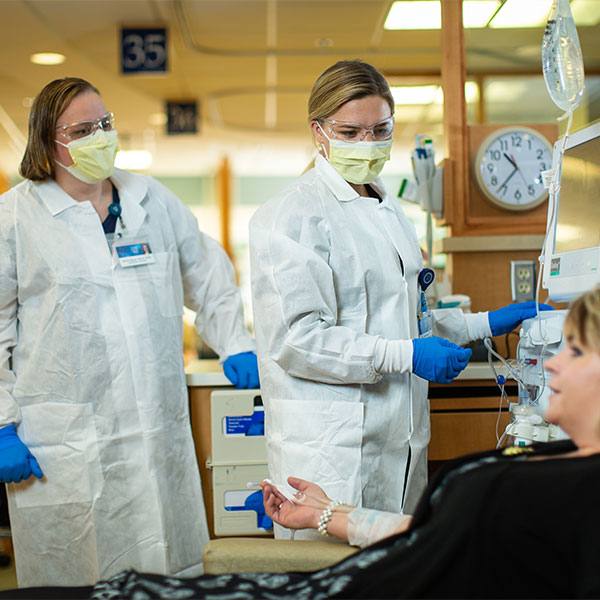-
How COVID-19 empowered regenerative sciences students for success

Training the workforce of the future is a strategic priority of Mayo Clinic's Center for Regenerative Medicine. Sometimes the most valuable lessons come from outside the classroom. This year, regenerative sciences students readily adapted to a stealthy foe that exploded on the scene, seemingly from nowhere. The COVID-19 pandemic triggered a rapid conversion to online classes and an immediate disruption of the best laid plans for regenerative sciences research.
Like a diamond being formed, high-pressure environments can produce brilliant results. Three students share how the COVID-19 pandemic helped them develop patience, persistence, flexibility and most of all resilience — all of which they hope to apply to cutting-edge research.
Claudia Manriquez Roman
Born and raised in Juarez, Mexico, Claudia Manriquez Roman enrolled in Mayo Clinic's Regenerative Sciences Training Program with visions of discovering new therapies for cancer. Mayo's robust opportunities for bench-to-bedside research attracted her to Mayo Clinic Graduate School of Biomedical Sciences, where she is pursuing a Ph.D. in virology and gene therapy.

"My goal is to develop next-generation, genetically engineered cellular therapies for cancer," says Manriquez Roman. "The enriched regenerative science curriculum at Mayo Clinic facilitates the translation of research projects into clinical care and exposes me to broader aspects of research beyond my field of interest in both academia and industry."
Manriquez Roman's research focuses on developing and optimizing chimeric antigen receptor-T cell therapy (CAR-T cell therapy). CAR-T cell therapy seeks to harness the power of the immune system by genetically modifying cells, equipping them to go on search-and-destroy missions to kill cancer. These engineered cells become a living drug within the body that continually fights disease. CAR-T cell therapy is new, and research is needed to break down the hurdles of high cost and long waits for clinical trials.
"What I really hope to learn from my primary research is the biology behind CAR-T cells so that hopefully researchers can transform this type of individualized medicine into a new potentially curative modality for blood cancers in a way that will be safe, effective and affordable," says Manriquez Roman.
She had meticulously planned out her research and lab time for the entire year. When COVID-19 permeated through Minnesota, all nonessential research, including Manriquez Roman's, was paused for three months until Mayo's research community could better understand ways of controlling the spread of COVID-19. Once Mayo established safe protocols for resuming research, Manriquez Roman got back to work, albeit at a slower pace than what she had originally planned.
"Our research group decided to schedule eight hour shifts in the lab, which really gave me the opportunity to learn and adapt to the different online tools provided by Mayo. I must admit that now that I have a schedule shift, I am more productive and focused on my research work. For the first time since I started my Ph.D., I have been able to maintain a work-life balance that allows me to disconnect from science and spend quality time doing other activities, such as hiking and yoga."
After she completes her research project and graduates with her Ph.D., Manriquez Roman has her sights set on a postdoctoral fellowship in gene therapy. She eventually wants to establish her own research program with a long-term goal of developing international initiatives that would foster collaboration in gene and cell therapy between the U.S. and Latin America.
Naga Rallabandi
Naga Rallabandi's career has taken some labyrinthlike turns since graduating with an engineering degree from Jawaharlal Nehru Technological University in Hyderabad, India. The allure of manufacturing viral vectors for stem cell and gene therapy attracted her to research. The potential of applying that research to unlock the mysteries of single-gene diseases such as sickle cell anemia and Fanconi anemia drew her to Mayo Clinic's Regenerative Sciences Training Program. She, too, is a doctoral student in the Virology and Gene Therapy track.

"Mayo appealed to me because it offers a graduate program this specialized," says Rallabandi. "With my research at Mayo Clinic, I hope to take the field of regenerative medicine a step closer to successfully curing genetic diseases."
Rallabandi's research uses induced pluripotent stem cells, derived by engineering skin fibroblasts (cells). These adult cells are reprogrammed to go back in time to a state when they could differentiate into any type of cell or tissue in the body. Her studies explore gene-editing of induced pluripotent cells to permanently correct genetic errors with the hope of one day transplanting corrected cells in a patient.
"My research is to develop a measles virus vector system in order to reprogram, and gene-edit disease- gene-carrying fibroblast cells into corrected, disease gene-free induced pluripotent stem cells," says Rallabandi. "There are 10,000 monogenic diseases that are caused because of a single error in a single gene in the human DNA. The targeted correction of error in the gene is a crucial step toward curing several monogenic diseases. My research addresses the hypothesis that such genetic diseases can be cured using stem cell therapy."
The onset of COVID-19 was another twist in Rallabandi's career labyrinth. Safety measures to control the spread of COVID-19 led to altered lab routines and an ambiguous type of new normal. She and fellow researchers had to work in shifts defined by social distancing. In the face of adversity, she found grit and determination to cope and move forward with her research.
"Working in shifts taught me how to manage my lab time better. I started looking at things differently and realized it was important to have more balance in my life. I reached out to old friends with whom I had lost touch. I took this as an opportunity to get a pet, which has taught me how to be more responsible and caring," says Rallabandi. "I am going to belong to that generation of scientists who are more empathetic and passionate in serving society."
The difficulties of COVID-19 have only strengthened her resolve to pursue a research career aimed at discovering, translating and bringing to market new stem cell therapies. Her long=term goal is to start her own company that manufactures new validated stem cell procedures to address unmet patient needs.
Dileep Monie
Dileep Monie, a native of suburban Minneapolis, left high school early to start a biomedical research career that took him from academic laboratories to a biotech startup. After earning a bachelor's degree from Harvard University, he was drawn to the blend of medical education, integrated research training, innovation culture and collaborative approach to patient care at Mayo Clinic Alix School of Medicine. Monie is enrolled in the Medical Scientist Training Program, where he is pursuing his M.D.-Ph.D. in the Immunology graduate track with a concentration in regenerative sciences. His areas of interest are systems immunology, regenerative bioengineering and neuro-oncology.

"My ultimate goal is to engineer better cancer immunotherapies by designing synthetic viruses that not only eliminate brain tumors such as glioblastomas, but also regenerate healthy tissue in the central nervous system," says Monie.
Monie's primary research project seeks to better understand how the body's immune system responds to viruses. A central part of his research is probing why certain viruses kill brain cancer cells and stimulate immunity against tumors in some patients but not in others. This complex project brings together machine learning, artificial intelligence and synthetic biology.
When COVID-19 forced social distancing, Monie completed his Ph.D. coursework through remote learning. All research was transitioned to online platforms, as well. It was a lesson in ingenuity and quick adaptability.
"Luckily, systems biology research lends itself well to this arrangement, as it is largely computational," he says. "Coincidentally, COVID-19 is also a product of host-virus interactions, with treatment goals that are just the opposite of oncolytic viruses. We need to reduce the impact of the virus on host cells in this case. Therefore, I am using recently made available SARS-CoV-2 datasets to build more advanced immunobiological models to complement my thesis. The tools our group has developed may be able to identify new treatments that will alleviate suffering from COVID-19."
After Monie graduates from the Mayo Clinic Alix School of Medicine, he plans to pursue residency in neurosurgery and fellowship training. His long-term goal as a physician-scientist is to establish a systems and synthetic neuroimmunology research laboratory that will translate basic scientific discoveries to advance clinical care for patients.
While the lessons learned from the COVID-19 pandemic undoubtedly are not ones that any researcher would ask for, the research trainees now have a testament of empowerment and resilience to handle new difficulties that come their way during the course of their careers.
###
Related links:
- Published research about Mayo Clinic's experience in virtual regenerative learning in the time of COVID-19
- Mayo Clinic's doctoral program in regenerative sciences







